SW Veterinary
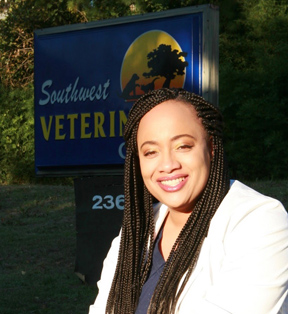
Photo by Morrell Gray
Dr. Makeba Clarke, 38, is the new owner of Southwest Veterinary Clinic in Atlanta. The practice was founded nearly 50 years ago by one of the first Black veterinarians in the city. Although Southwest closed for a time before she bought it, Clarke thought it was important to keep the original name.
This is the second of two parts. Read part 1.
The telephone call that turned Dr. Makeba Clarke into a business owner was not exactly flattering.
On the line was an old classmate from Tuskegee University College of Veterinary Medicine. A relative who owned a veterinary clinic had just died, and the practice was for sale. The classmate worked for the government and didn't want the clinic, so she started calling colleagues. "You're my 20th call," she told Clarke.
Someone else might have thought, "If no one else wants it, why would I?" but Clarke was intrigued. In June 2017, she visited the humble residential neighborhood eight miles outside downtown Atlanta where the clinic property was located. There wasn't much to it. Cinderblock building. Walls grimy from cigarette smoke. No modern equipment. But where someone else might see a risky gamble, Clarke saw a future. She tried not to betray her excitement.
The woman handling the sale also played it cool. "I have a lot of buyers, and I'm not even sure I'm going to sell it to a vet," she told Clarke. "I'd like to, but it's really going to go to the highest bidder."
Thus began a new chapter in Clarke's career. Five years out of veterinary school, she entered the realm of entrepreneurship. First order of business: When negotiating a deal, don't seem too eager.
By chance, Clarke was being recruited at the same time to practice for a nonprofit animal welfare organization in Florida. If she took the job, she would live closer to her father and other relatives, an attractive proposition. So she told the people in Atlanta, "Let me know when you're ready to sell," and left for Miami.
Late in 2017, about two months after Clarke began the new job, the sellers called: They were ready.
Since graduating from veterinary school in 2012, Clarke had worked for a large corporation, an emergency hospital and now a nonprofit. She felt ready to be the boss. "I just want to be in charge of my own destiny," she told the VIN News Service in one of several conversations about her journey to practice ownership. "I want to be in charge of protocols. I want to set the tone for my own environment."
Clarke knew no one who'd started a business from scratch, so she had a lot to learn. In January 2018, Clarke took a three-day crash course at VMX, a large veterinary conference in Orlando, on how to open your own practice. She queried banks until she found one willing to work with her. The bank asked for a business plan. She had no idea how to prepare one, and consultants she called charged $10,000. By chance, she made a friend in Miami who turned out to be an accountant. He agreed to help at the much more affordable rate of $45 an hour.
Clarke hired what she called "moles" to research veterinary fees in Atlanta practices. "I'd pay them $40 to go with their dog and ask how much it will cost for preventive care," she said. "That was my market research."
The accountant had her imagine an average day at her clinic. She figured she could see anywhere from five to 20 patients a day. "From that, I could deduce how much I could make in a day, a week, a month," she explained.
Online, she found a lawyer who works with startups. He helped her dress up her 18-page business plan, which the bank accepted in November 2018. "And then," Clarke said, "the real work began."
'What do I want to build?'
She applied for a half-million-dollar loan from the U.S. Small Business Administration, of which $389,000 would go toward acquiring the clinic property. The practice itself, having been closed for more than a year, was not producing revenue and therefore considered to have no value.
The logistics of securing the loan was itself a project. "I had to complete maybe 50 tasks," Clarke recounted: "Get a business license, building insurance, employee insurance, all this stuff that I thought about and knew but ... it's one thing to know about doing, and it's another to, like, do it!"
At the same time, she was still working four days a week for the nonprofit practice in Miami, 650 miles away, and pulling one or two relief shifts a month in private practice. She worked after hours on the long list of tasks.
Cleaning
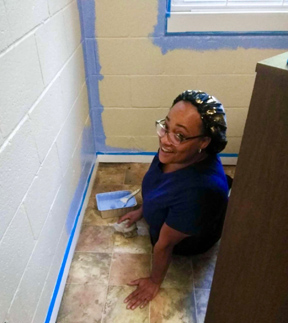
Photo courtesy of Dr. Makeba Clarke
Aided by family and friends, Dr. Makeba Clarke spent much of the summer of 2019 deep in an unglamorous aspect of business ownership: cleaning, sprucing and equipping clinic property she'd just bought in Atlanta.
To prepare for running a business, she read widely, listened to podcasts and looked at other businesses with fresh eyes — "observing more," she called it. "Not even things veterinary-related, but what am I starting to build here, besides the name and the area. What do I want to build — like, the culture? I started to think about: When I walked into a place, what makes me like it and what makes me not like it. What makes me feel special as a customer?"
By the time the loan came through, Clarke had plowed about $75,000 of her savings into the venture. She had a sizable student debt — close to $200,000 when she graduated, typical for the veterinary profession — but she didn't let the prospect of even more debt scare her.
For one thing, she said, "The banks don't care. They look at your payment history. In the end, you're going to pay it.
"You just, inside, have to be comfortable sleeping at night knowing you probably owe close to a million dollars now, between vet-school debt and opening-a-clinic debt," she said. "You have to be OK with that."
'This young lady's got something'
The clinic sale closed in late June 2019. One day, while cleaning and organizing, Clarke was visited by Drs. Francoise Tyler and Will Draper, a wife-husband veterinarian team who have three practices in and around Atlanta. Tyler had grown up near Clarke's new practice and worked, as a teenager, for the previous owner, Dr. William McCant.
Clarke, Tyler, Draper and McCant were all Tuskegee alumni. One of the first Black veterinarians in Atlanta, McCant operated the practice he called Southwest Veterinary Clinic for close to 50 years. McCant was an old-school veterinarian and something of a character.
A diabetic, he'd had a leg amputated but that didn't slow him, as Draper recalls. An enduring memory he has of McCant is of the man "running around the clinic, smoking, in a wheelchair."
William DeCant
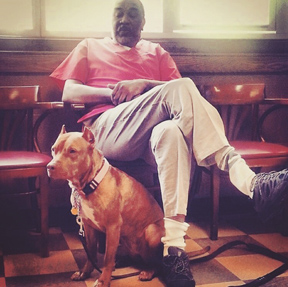
Photo by Richard Mathis
Southwest Veterinary Clinic founder Dr. William McCant was photographed in the mid-2000s with Sister Caramelo, a patient at the clinic.
McCant was the kind of person who would give away care to pet owners who couldn't afford to pay, and he was a pillar in the community, serving for a time on the state veterinary medical board, Draper said. Earlier in his career, McCant served in the U.S. Army as a large animal veterinarian and worked for the U.S. Department of Agriculture, according to an obituary published in Tuskegee Veterinary Medical Perspective magazine. He relished playing games in his spare time, from tennis to chess, the article says: "Anyone who ... engaged him in anything competitive knew to expect rigorous trash talking and a rousing time."
When Tyler heard that a young female veterinarian had bought McCant's practice, she wanted to meet her. After visiting family in the neighborhood one day, she suggested stopping by. Draper was reluctant, wanting to head home across town, but his wife insisted.
"I was tired, and I went down there and saw that she had painted, she had cleaned, she had her logo on the wall," Draper recalled. "She just had so much excitement and enthusiasm and also was inquisitive and would listen."
He thought to himself, "This young lady's got something."
The threesome clicked. Clarke, recognizing her more established colleagues as a friendly resource, asked, "Can I reach out to you sometimes?" Draper said sure. He quickly evolved into a mentor.
Draper worried that McCant's former clients would expect Clarke to do things the same way he did; that they would argue, "Dr. McCant wouldn't have charged me so much. Dr. McCant wouldn't have made me do blood work."
"You need to figure out the best way to slowly educate them without shoving this state-of-the-art practice down their throat," he counseled. "Help them taste it and digest it and kind of help them understand that it's really best for their pets. You have to educate them first and help them understand that pets are worthy of that treatment."
'There are people out there who will take advantage'
Clinic cleaned
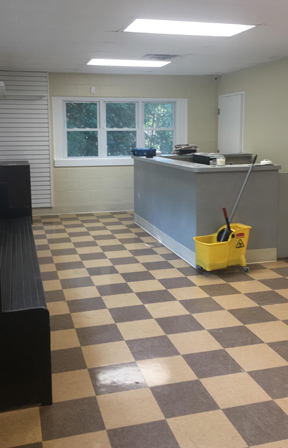
Photo by Dr. Makeba Clarke
Once the place was tidied and freshened, Dr. Makeba Clarke found that things like the old linoleum floor that she initially hated were perfectly suitable. Looking back over a hectic, sometimes rocky, first year in business, she thinks, "Wow, if the floors were my only problem!"
At the same time that Clarke received support from colleagues like Draper and Tyler, she learned that not everyone who acted friendly was truly a friend.
That lesson came out of a decision to do business with a veterinary equipment vendor she had found online. Clarke couldn't afford new equipment, so she bought it used, ordering some $46,000 of goods — from blood analysis machines to dog bathtubs and many other items — and had the bank pay the bill upfront from the proceeds of her SBA loan.
Big mistake.
Some of the purchases were fine, but many were not. Some purchases never arrived; others were missing parts or simply didn't work.
The salesman who had been so solicitous early on, who remembered the names of her cat and dog, suddenly was uncooperative and hard to reach. The bank was no help, either. Clarke said their reaction was, "Ooh, what are you going to do?"
Clarke was furious. "You mean to tell me that if I had paid through my credit card or with PayPal that I'd have more protection right now?" she said.
After weeks of making phone calls, sending emails and even hiring a lawyer to try to recover the $23,000 she estimates she is owed, Clarke decided to swallow the experience as an expensive lesson. "My takeaway is that I will never pay somebody with a check or wire transfer ever again in my life if it's over $1,000," she declared.
She tried to find comfort in the big picture. "I know this is just a hiccup and this hopefully will be funny in a few years," she said. "I was just so devastated that there are people out there who will take advantage."
'People really care'
Pushing toward a mid-autumn opening, Clarke hired two employees: The first was a veterinary assistant whom she'd worked with at a Banfield Pet Hospital practice in Macon a few years earlier. The second was a former PetSmart groomer, a young man comfortable around animals.
First client
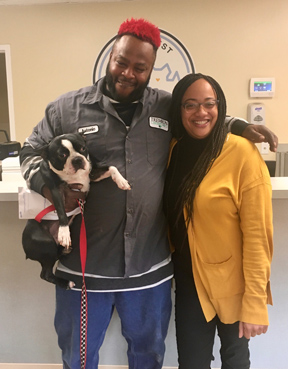
Photo courtesy of Dr. Makeba Clarke
A week after opening in early November 2019, Dr. Makeba Clarke served her first client (left), whose dog was due for vaccinations. A native of Boston, Clarke was tickled that the patient was a Boston terrier.
Opening day was Nov. 1, 2019, a Friday. The event drew a lot of curious visitors, people wanting to take a look around. Clarke heard encouraging comments like, "Wow, it looks the same but different. It smells better." But it took a week, to Nov. 8, for the reborn clinic to receive its first paying client, the owner of a Boston terrier due for vaccinations.
Four months in, as the team got into a groove, something happened that wasn't in the business plan: a pandemic.
Across the country and the world, activities halted as people retreated to their homes in an attempt to protect themselves from the novel coronavirus that causes the potentially fatal disease COVID-19. Veterinary practices, widely considered essential services, generally were allowed to continue operating, and Clarke did not close the clinic. But its operations changed dramatically.
Like clinics everywhere, Southwest Veterinary stopped allowing clients into the building. The team scrounged for hand sanitizer and personal protective equipment. "Because I'm a small business, I don't buy everything in bulk, so it was tough," Clarke said. "Are we going to run out of masks? What about gloves? Oh, I can't order bonnets right now, I can't order shoe covers right now, I can't do as many elective surgeries as I would like."
Business was slow in April and May. Then, as COVID-19 caseloads eased, visits picked up. But the pandemic had not loosed its grip, and the virus invaded Clarke's personal life.
Her 66-year-old dad caught COVID-19. In fragile health already — on dialysis, with a heart condition, pancreatitis and gall stones — the viral infection was more than he could withstand. He died on July 20.
Clarke returned to work after taking a few days off, thinking that because her dad had been ill for some time, she was emotionally prepared to lose him. She wasn't. In a fog, she forgot to pay her employees. Then she had a car accident, her first. "At the clinic," she said, "I backed into someone's car."
Surrendering to grief, Clarke closed the clinic for a week. Her new community surprised her with its response. "Everybody was really, really nice in a way that I didn't expect," she said. "People sent me plants and cards, customers I'd seen only twice. It was a bright spot. It's like, people really care."
'I'll treat her like she's my own'
Approaching the first anniversary of owning the practice, Clarke reflected on its style and identity. "I see myself as a mom-and-pop boutique kind of clinic," she said. "I might not be able to keep pets 24-hours a day and do internal medicine, but I have clients who need my services."
Like her predecessor, McCant, Clarke believes that people should receive veterinary attention for their pets even if they can't afford the gold standard. "I know some think that it undermines what we do as vets," she said. "I do not."
She knows what it is to have limited means and still want animals in your life. Growing up in inner-city Boston in a one-parent household, Clarke said, "We didn't always have money to take our dogs to the vet."
She was called recently to put her philosophy into practice. Just before closing time one evening, an acquaintance from college came to the clinic with a dog in trouble. The dog had pyometra — an infected uterus. The owner had taken her pet to an emergency hospital, where the cost for a needed surgery was $5,500, more than she could afford. Without the surgery, the dog was likely to die.
Clarke ran some numbers. "When I calculated how much I could do it for," she said, "it was $2,500."
Why was the difference so great? the owner asked. "I explained to her, emergency hospitals have way more staff and more equipment. You'll have a tech all the time with the dog ... But I can do the surgery, and I'll treat her like she's my own dog."
"If I didn't own my own clinic," Clarke told VIN News, "there's no way I could make those tiny little decisions that cost me my time. My time is valuable, but I was able to help a classmate and a dog, Sasha. She's healing and eating, alive and well."
Another reason that Clarke's services are more affordable: She doesn't pay herself a full salary. To help make ends meet, she picks up relief shifts at two area clinics every other Sunday. Clarke pays herself one-third the rate she earns working relief. But things are improving: In the coming quarter, she anticipates paying herself two-thirds her relief rate.
Draper, her mentor and one of her relief employers, marvels at Clarke's drive and relentless positivity. He counts himself fortunate to be in her orbit. As someone in practice for 30 years, Draper said, "At times, I start to get burnt out. When I met Makeba and saw her energy, it really just gave me juice and put some fire under me that I needed."
Looking back on her winding path to practice ownership, Clarke, in turn, marvels how apparent dead ends and detours led her right where she wants to be. For example, she used to be embarrassed that before veterinary school, she drifted for years at community college. Today, she's prouder of that degree even more than her others. "I had to overcome the most at that time personally and professionally," she explained. "It's analogous to getting a car moving, or any heavy object, by sheer force. The beginning is the hardest."
She also thinks about moments when encouragement from friends, acquaintances and even strangers proved pivotal, and envisions paying those favors forward. "Now, hopefully," she said, "I can be that person that someone else needs."
Part 1: From doubting to daring